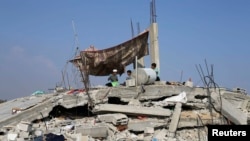The Israeli military says it has carried out air strikes in the Gaza Strip in response to Palestinian rocket fire.
The military said early Thursday it targeted "terror sites" in Gaza. It said at least three rockets were fired into Israel shortly before a 72-hour cease fire between Israel and Hamas expired late Wednesday.
This comes as Egyptian and Palestinian officials said Hamas agreed to extend the 72-hour truce with Israel for five days.
The head of the Palestinian delegation, Azzam al-Ahmad, said officials hope to reach a final agreement in the coming weeks that has full Arab, regional and international support.
Israel had no immediate comment about the five-day extention or the deal reached in Cairo, meant to end nearly five weeks of fighting between Hamas militants and Israel that has left more 2,000 people dead, mostly Palestinian civilians.
U.S. President Barack Obama, on a two-week vacation, consulted with Israeli Prime Minister Benjamin Netanyahu by telephone, though the White House did not offer details of their conversation.
Lifting of blockades addressed
A Palestinian official with knowledge of the negotiations told Reuters that Egypt had presented a new proposal that addressed a major Palestinian demand: lifting the Israeli and Egyptian blockades of the Gaza Strip.
Israel and Egypt both have deep security concerns about Hamas, the dominant Islamist group in the small, Mediterranean coastal enclave, complicating any deal on easing border restrictions.
Hamas is part of the Palestinian negotiating team in Cairo, but Israel considers it a terrorist group and refuses to meet with it face to face. Members from President Mahmoud Abbas’ moderate Fatah party are also part of the delegation.
It was unclear from the official's remarks how those worries, along with Israel's demand for Gaza's demilitarization, would be dealt with.
Disarming was not an option, Hamas spokesman Sami Abu Zuhri said.
If the cease-fire succeeds, “Israel has other options. And if we have to use those other options, it’s better that we can say that we first of all tried a more peaceful path before we had to use the other ones," Israeli government spokesman Mark Regev said.
Azzam Ahmed, the leader of the Palestinian negotiating team, said the negotiations were at a very sensitive stage. Hamas negotiator Izzat Risheq said his delegation making every effort to achieve a positive outcome.
Egyptian and Palestinian sources said Israel had tentatively agreed to allow some supplies into Gaza and relax curbs on the cross-border movement of people and goods, subject to certain conditions. They did not elaborate.
Israeli officials remained silent on the state of the talks.
A key Palestinian demand has been construction of a seaport in Gaza and reconstruction of the airport destroyed in previous conflicts with Israel. That has also been a stumbling block, with the Jewish state citing security reasons for opposing them.
The gaps are wide, so Egypt has proposed an interim deal to forestall a resumption of hostilities. For example, Israel would partially ease the blockade on Gaza, while negotiations continue on thornier issues, such as open borders for Gaza and the disarmament of Hamas.
Fishing Limits
As part of the Egyptian deal, Israel would expand fishing limits it imposes on Gaza fishermen to six miles from the usual three-mile offshore zone.
In addition, the official said, the Egyptian plan calls for reducing the size of a “no-go” area for Palestinians on the Gaza side of the border from 300 yards to 100 yards so local farmers can recover plots lost to security crackdowns.
One Palestinian official said the Palestinian delegation had agreed that reconstruction in Gaza should be carried out by the unity government set up in June by Hamas and Fatah.
Egypt as mediator
Though Hamas is part of the Palestinian delegation, Israel has refused to meet with its negotiator, since it considers Hamas a terrorist group. That has resulted in indirect talks, with Egyptian officials shuttling proposals back and forth.
Defense Minister Moshe Yaalon, speaking on Tuesday, told Israel's armed forces to prepare for a possible resumption of fighting.
A previous cease-fire last week expired without a longer-term deal and Palestinian rocket attacks and Israeli air strikes resumed, though with less intensity.
Israel pulled ground forces out of Gaza last week after it said its army had completed the main mission of destroying more than 30 tunnels dug by militants for cross-border ambushes. It now wants guarantees Hamas will not use any reconstruction supplies sent into the enclave to rebuild the tunnels.
Robert Berger contributed to this report from Jerusalem. Some information for this report provided by Reuters.





